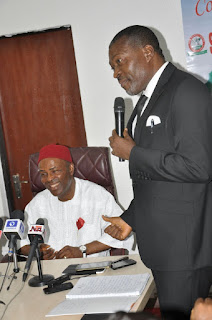KANAYO O.
KANAYO ON WHY HE WENT INTO YOUTH MENTORING
Nigerian popular actor Mr.
Kanayo Onyekwere Kanayo has launched a mentoring academy to help young
Nigerians to discover themselves and rise to greatness. The academy is known as
Kanayo O. Kanayo Mentoring Academy (KOKMA)
Speaking at the formal
launch of the academy in Lagos , Kanayo said Nigerian youths are faced with
many societal problems which pose danger to their dreams and aspirations. He
said the academy would provide a platform for the youths to be shown direction
and taught proper values
In his words, “Kanayo O.
Kanayo Mentoring Academy is about mentoring the young ones. It is a way of
giving back to the society. The key message of KOKMA is to let the young ones
know that they can be whatever they desire to be in life. Therefore, they must
be guided in order not to allow any circumstances to limit their desire to
excel in life”
“The academy is coming to
give hope to our youths, realizing that Nigeria and indeed Africa’s future lies
with the youths. We will try to do so by building attitudes for greatness.
Attitudinal change is key and we can do that by inculcating in them the sense
of self-worth and I-can-do-spirit
“KOKMA shall build a crop
of youths who can predict their future by creating it, discover their in-born
potentials and harvest them; youths who will realize that success begins with
them and who will love their society and the environment and consequently
impact the world”
While lamenting the
continuously poor students’ performance especially in WAEC examination, he
assured that the new academy will constantly work to equip students in various
institutions with life tools and opportunities that will make them rise above
different situations and challenges
According to him, “The
standard of education, which is the bedrock of youths development is
dangerously dwindling, school drop-out ratio is in the increase. Students’ performance in WAEC examinations is
continuously falling. With the nose-diving national economy and the society’s
value system perilously tilting to the negative, our youths truly need a sense
of direction via mentoring” He stressed.
He also noted that the
youths, the young adults, the generation x and Y who constitute about 40 per
cent of our population, who unfortunately are under-privileged or have been
negatively influenced with wrong orientation may have lost hope in themselves
and the future.
“We want to change their orientation to life
through moulding, give free education materials and make them better citizens
for the future.” On what inspired him to establish the academy, Kanayo said
there are many things Nigerian youths did not experience which the older ones
did. Through mentoring, he said the youths would know about this and therefore
know how to be focused in order to succeed
He said that the academy
is not a formal school where people will sit in classroom to be taught, but a
project which would take him and other members of the Board to schools, where
they would talk to students, share their experiences and encourage them to
inculcate good values which will help them in life
He said that the visit to
schools will not be concentrated on elite cities or neighbourhood but to public
schools in urban and remote villages
“What we want to do is to
influence, train and affect people. We will not target going to elite schools,
but schools in the remotest areas across the states in Nigeria. We need to
identify needs and call attention to them while building strength and equipping
the students,” he said.
According to him, when
members of the academy go to school in remote villages to talk with students,
national attention will be brought to such institution and area, which could
then serve as an opportunity for government to know the problems and therefore
move in to help.
Kanayo said that the Board
of KOKMA has Mr Tim Akano, Managing Director, New Horizons; Ms Sienne
Allwell-Brown, Dr. Maxwell Ubah, Charles Okafor, Mr Alozie Nwokoro and himself
as members
Mr Akano, who was the
chairman of the event, eulogized Kanayo for the lofty vision of seeking to
mentor youths with the view to adding value to their lives






